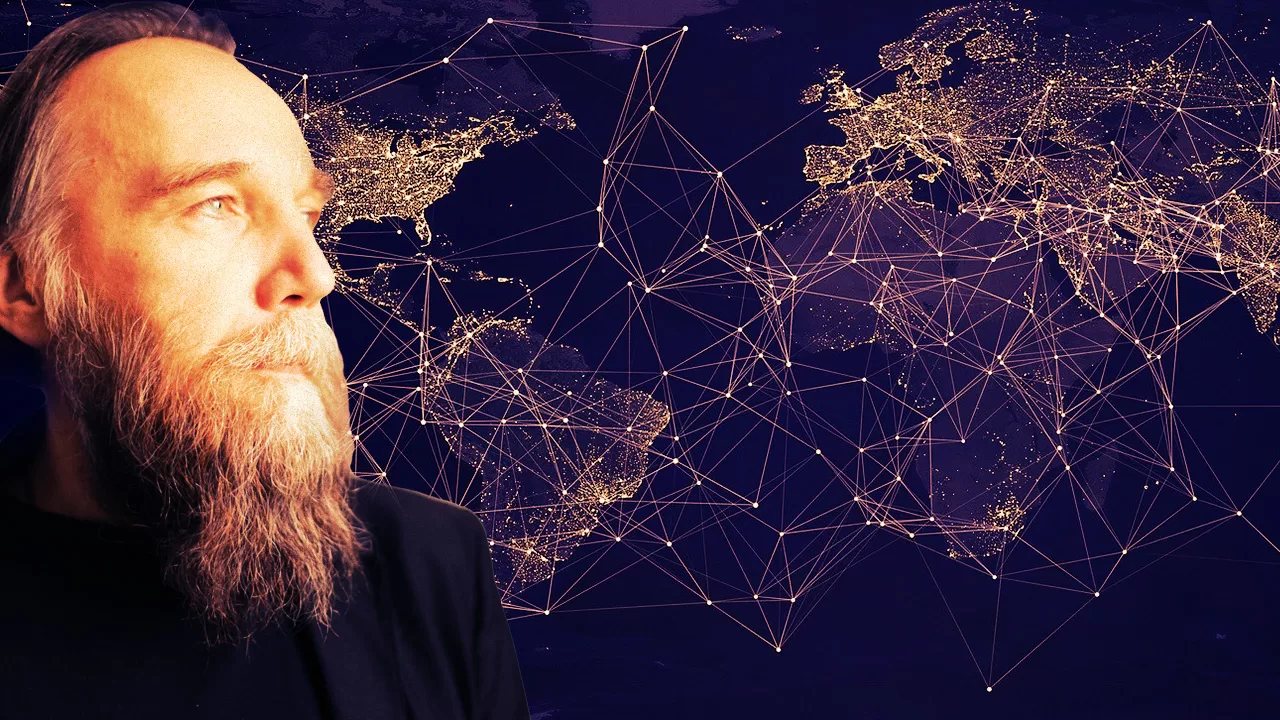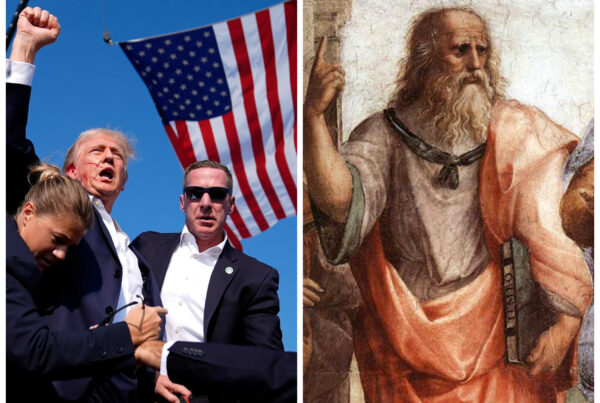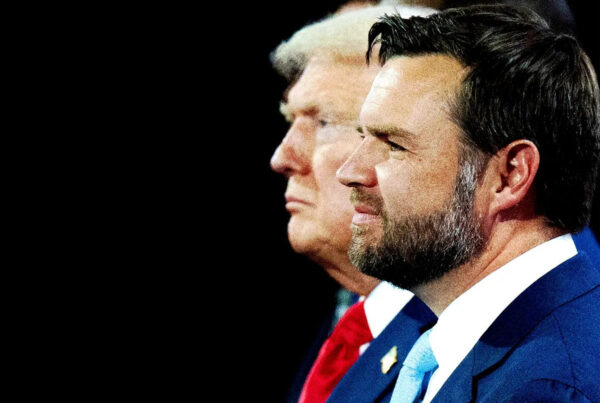Europe suffers from its ties to the United States and the ‘Western community of values’. Neither in terms of its identity (mass immigration, individualism, gender politics) nor in terms of its economic and energy policy (anti-Russian sanctions) do the close ties to the US and liberalism offer Europe a future. But what can a revolutionary alternative to the ‘New World Order’ and globalisation look like? With his book Eurasian Mission, the Russian philosopher Alexander Dugin presents a revolutionary counter-proposal to the Western world order, which also promises a hopeful future for Germany and Europe. In the following, Dugin’s most important thoughts in this book will be presented and it will be determined whether the book is also of interest to patriots in Germany.
Eurasian Mission — an Alternative to Transatlanticism
Dugin describes, on the one hand, the development of the Eurasian idea, beginning with Eurasianism in the interwar period through Neo-Eurasianism towards the end of the Soviet Union to the Fourth Political Theory at the end of the 2000s, and, on the other hand, he sets out why this represents an alternative to Transatlanticism not only for Russia but also for the other civilisations of the world. The texts compiled for this book cover a long period, from the early 2000s (‘Manifesto of the Global Revolutionary Alliance’) through the late 2000s to the early 2010s (Texts on the Fourth Political Theory, interview with Dugin shortly before Putin’s re-election in 2012) to 2022 (his texts on the Russian military operation in Ukraine). In addition, the German edition contains a preface by Peter Töpfer on Dugin’s Radical Subject, which refers to his philosophical work. The texts also explore a crucial question: What makes Eurasianism and the Fourth Political Theory a revolutionary answer to liberalism for Germany and Europe?
For the Diversity of Peoples, Against Western Universalism
The revolutionary nature of Eurasianism is revealed in its rejection of Western universalism in all its dimensions. Every people must live in a Western-style democracy? All economies should obey the laws of the free market and capitalism? These are precisely the ideas that Eurasianists radically reject. This also has a lot to do with their developmental history: following on from the Slavophiles, who rejected liberalism as early as the 19th century and proclaimed an independent Russian civilisation distinct from the West, Eurasianists began to think about Russia’s place in the world in the European exile of the 1920s after the end of the Russian Civil War. It was the main representatives of Eurasianism, such as Nikolai Trubetzkoy1, Petr Savitsky2 and Lev Gumilyov3 who rejected the Western demand to go spiritually from “East to West” and insisted on their special Russian-Eurasian identity, which they explicitly understood not only as a synthesis between East Slavic and Finnish culture, but also the Mongolian and Turkish ways of life. Of particular importance is the passionarity effect, which, according to Gumilyov, leads to an active and intense way of life (of the steppe peoples) and represents a genetic mutation in the ethnos that contributes to the birth of passionate people.
The World: Not a Universe, but a Pluriverse
In analogy to the representative of the Conservative Revolution, Oswald Spengler, they coined the concept of civilisation, whereby they understand it not as a decaying form of culture, but as one cultural circle among many, to which different peoples and cultures can unite because of commonalities in their history, culture and religion. In contrast to the Western liberal thinkers of the 20th century, who claimed that there was only one Western civilisation and that all other peoples were barbarians, the Eurasianists proclaimed the plurality of civilisations and thus a pluriverse in contrast to the Western idea of a cultural universe. Thus, while rejecting the notion of a unified ‘One World’, they hold the view that there are as many worlds as there are peoples in the minds of humans, each created first in thought by the unique language of these.
Earth: the Habitat as a Decisive Influence in the Formation of Peoples
Drawing on the discipline of geosophy, the Eurasianists noted that there can be no universal pattern of human development, since the multiplicity of landscapes on Earth also produces a multiplicity of cultures, each with their own cycles, internal criteria and logic. The habitat thus defines the people living in it; the peoples become the expression of the landscape in which they live. Accordingly, the Eurasianists advocated analysing civilisations along a spatial axis as well.
The Neo-Eurasianists: Eurasianism plus Traditionalism and Geopolitics
The Neo-Eurasianists, who began to make a name for themselves in the late 1980s and whose most important representatives include Alexander Dugin, took up the ideas of their ancestors and enriched them with the thinking of the Conservative Revolution and geopolitics. The emergence of this movement of thought was made possible by the erosion of the Soviet Union, which after the end of Stalinism was caught in a domestic political conflict between reform-oriented/social democratic forces and conservative-minded hawks. The victory of the reformist forces was followed by the break-up of the USSR and the emergence of a Russian state whose elite perceived Russian culture as something alien to be assimilated into Western culture. The Neo-Eurasianists, in turn, were able to establish themselves as one of the strongest oppositional forces against precisely these elites, whereby National Bolshevism, which had emerged from the cooperation between former conservative cadres of the CPSU (Communist Party of the Soviet Union) and conservative-patriotic oppositionists, represented only an intermediate step on the way to the further development of Neo-Eurasianism. Following Carl Schmitt, they understood the struggle between the West and the Eurasian civilisation as a conflict between progressive-globalist-minded sea powers and conservative-traditionalist-minded land powers. In the context of this world-historical conflict between land and sea, each state and cultural group could choose a side; the Neo-Eurasianists as opponents of the unipolar world order and globalisation plead at this point to take the side of the land power in the great war of the continents. Finally, also of great importance for Neo-Eurasianism is the philosophical school of thought of Traditionalism with its representatives René Guénon, Julius Evola and Titus Burckhardt, since this represents a general reckoning not only with liberalism and capitalism, but with the whole of modernity itself, emphasising the primacy of the idea and religion. Consequently, Neo-Eurasianism is an anti-imperialist, anti-modernist and anti-capitalist ideology, whose aim is to restore the traditional way of life and thinking of the civilisation in question.
Great Spaces and Civilisations as New Actors in Geopolitics
Also building on Carl Schmitt, they see not the nation-state but greater spaces in the sense of civilisations as the actors in this struggle. Dugin sees the future of the nation-state in the struggle against globalisation as facing three possible choices:
- the absorption into a future world state,
- resistance to unipolarity while maintaining the nation-state order, or
- the abolition of the nation-state in a large-scale formation.
Following Carl Schmitt, Alexander Dugin advocates civilisations and greater spaces as the future forms of organisation in geopolitics. According to his logic, this does not correspond to nationalism, which uniformises and unifies its citizens in line with the thought matrix of modernity (see, for example, the French Republic or, in German history, the Third Reich), but to that of the empire, which always consists of a multitude of peoples and religions and is led by an imperial people. Dugin notes a pluriverse of civilisations, in which not only Russia-Eurasia, China and the Islamic super-space consisting of several civilisations, as well as South America, have a chance of emancipation from Western universalism, but also Europe itself, which at the moment is still a vassal of the United States.
Great Space, Autarky, Autonomy, Sovereignty
The idea of self-sufficiency and sovereignty are fundamental to the great space idea: because a nation-state alone cannot hold its own against globalisation, several nation-states must join forces and transfer their sovereignty to the level of the great space. Because one nation-state is not able to assert itself in the face of sanctions and Western blockade policies, several must unite to ensure their ability to act in an emergency. Important here is the concept of autonomy, which runs counter to the modern idea of centralism: thus, while the level of civilisation will take over important foreign policy decisions in the future, the lower levels of the great space will be responsible for autonomously shaping their own conditions in the sense of the principle of subsidiarity and the idea of E pluribus unum (creating one from many), which also includes cultural autonomy. In this context, autonomy encompasses not only the cultural level, but also the religious, social, economic and ethnic dimensions of life. With regard to the economic activity of great spaces, Dugin’s Eurasian Movement calls for four geo-economic zones. In contrast to transatlanticist thinkers who proclaim only three zones and see a black hole in Russia-Eurasia, Eurasianists advocate the establishment of the Eurasian continental belt as a fourth geo-economic zone alongside the American, Euro-African and Pacific geo-economic zones. While in the American geo-economic zone they advocate an organisation of the Central and Latin American great space as well as a restriction of the United States to itself, the Eurasianists in the European-African belt see an independence of Europe from the US and a formation of sub-Saharan Africa as a separate great space as important for the emergence of multipolarity. In the Eurasian continental belt, the great spaces of Russia-Eurasia and continental Islam have yet to be created, whereas India and China have already largely constituted the borders of their respective great spaces.
The Fourth Political Theory: Beyond Liberalism, Fascism and Marxism
Dugin sees the final step in the development of Eurasianism in the Fourth Political Theory. This is what he calls the draft for a new political theory that centres on Dasein according to Martin Heidegger, by which Dugin understands the people, and whose goal is the complete overcoming of political modernity. Dugin sees liberalism as the First Political Theory, Marxism as the Second and finally Fascism/National Socialism4 as the Third Political Theory. In his deconstruction of the ideologies, he removes their problematic elements — capitalism and individualism in the case of liberalism; collectivism, class thinking and materialism in the case of Marxism; and racial mania and state loyalty in the case of Fascism/National Socialism — in order to finally cast the elements of these theories that are positive in his eyes into a new form. In the case of liberalism, he recognises ‘freedom to’ as such, in the case of Marxism, the critique of liberalism, and in the case of Fascism, finally, ethnocentrism as an element worth preserving. Thus, in addition to a devastating critique of modernity — which he also conducts with recourse to insights from postmodernism, since he wants to fight the problem at its root — there remains a positive foundation of the Fourth Political Theory, which every nation and every civilisation can now use in order to preserve/rediscover their respective identities, free from the thinking of modernity and the compulsion to go ‘from East to West’, and at the same time to establish a political order that reflects it.
The Primacy of the Spirit: Going from West to East
While Dugin recognises in the European New Right/Nouvelle Droite the European manifestation of the Fourth Political Theory, he sees in Neo-Eurasianism the Russian-Eurasian variant of the Fourth Political Theory. On this level, however, Eurasianism means turning away from the modern West and its primacy of materialism, towards a path ‘from West to East’ that leads to the primacy of the spirit, which presupposes participation in the noomachy (the war of the spirit) and not mere spectatorship. Rule in the sense of Eurasianism is always ideocracy, that is, the permeation of the state with an idea that gives meaning to the whole structure of the polity, not an oligarchy of billionaires masked by a sham democracy. This undoubtedly poses a serious challenge to the West, which is not only the centre of the (formerly) unipolar world, but also of the spiritual devastation it has wrought. How is it to be resurrected after the Great Reset? Dugin’s writing also provides the first clues to this in the form of possible paths for the United States into the future.
How Can the West Overcome Modernity? A Question of Identity
Since the West makes no effort to respect the cultural characteristics and peculiarities of other civilisations, but on the contrary strives for their levelling by Western universalism — today probably most visibly through the ‘woke’ liberalism 2.0 of the Great Reset — Dugin calls for an uprising of civilisations and a ‘Great Awakening’ against Western hegemony. As is known from his writings on the Great Reset and the Fourth Political Theory, however, for Dugin this does not go hand in hand with a hatred of Western culture per se, but only means a rejection of the modern West, whereas he deeply respects the Western European tradition of the Middle Ages and antiquity, for example. Interesting at this point is the tripartite model of identity that the Russian philosopher and ethnosociologist presents with regard to the United States:
- Diffuse identity. Dugin understands this to mean a vague sense of common belonging that is confused, uncertain and weak. Diffuse identity only emerges in extreme situations, such as wars, revolutions and natural disasters.
- Extreme identity represents an arbitrary and artificial identity that becomes an ideology. Examples are nationalism or class or cosmopolitan identity. While it often emphasises some features of diffuse identity, it leaves others under the table and is a caricature of them.
- Deep identity lies beneath diffuse identity. It is what makes a people a people and is its foundation. The people does not consist of the present, but moves from the past to the future on the level of its language, culture and tradition. Deep identity represents the whole, which takes place in time as well as in space; it is the human being as existence. Quoting the German ethnologist Leo Frobenius, Dugin states at this point that culture is the earth manifesting itself through man. While Europeans still have their deep identity, the United States faces the problem that it was originally created on a cultural tabula rasa in North America to realise the utopia of modernity. The US was built neglecting the land that actually belonged to the Indians, thus from the beginning the US was a highly mobile society of nomads moving on the surface of an almost non-existent space. The party system of Democrats and Republicans represents the summary of its diffuse identity, which swings back and forth around the vectors of freedom, liberalism, individualism and progress.
Three Ways for Americans to Find their Deep Identity
Consequently, Dugin sees three possibilities for the United States:
- A return to European identity. Since they have no soil of their own, Americans can discard their modern identity and view their situation in terms of another existential camp from the perspective of Mother Europe. For European Americans, this would mean the coming of age of an authentic Dasein according to Heidegger.
- The American remains an American, but seeks his identity in the sense of the individualistic American logos. This leads him, in the sense of Protestantism, to the fact that the individual, who lacks rootedness, seeks his roots in heaven in the form of his own individual God, whom he must create for himself freely according to Friedrich Nietzsche. The numerous Protestant sects in the USA can be seen here as an example of the individual’s search for God. Through these, the individual procures depth in the modern age.
- The path of American existentialism, the individual preoccupation with death, which is made possible by the fact that society makes the individual free from everything, but also free for nothingness. Through this preoccupation with one’s own end, the content of one’s being can finally be awakened.
Overall, Eurasian Mission by Alexander Dugin is a fascinating read that provides a better understanding of Eurasianism and the emerging Multipolar World. Given the perspectives that Eurasianism also offers Germany and Europe, it will hopefully be read often and discussed even more often. Germany and Europe need alternatives to the collapsing transatlanticism — one can be found in this book.
11890–1938, Russian linguist, historian and founder of morphonology. One of the leading representatives of the Eurasian Movement, known for his book Europe and Mankind.
21895–1968, co-founder of the Eurasian Movement, economist and geographer. Fought against Communism in the Russian Civil War on the side of General Wrangel.
31912–1992, Soviet historian and ethnologist. Rejected the thesis of the ‘Mongol yoke’ in relation to Russian history and instead assessed the symbiosis of Russians and Turkic peoples such as Mongols positively.
4Dugin himself differentiates between the two concepts and their respective subjects — state in Fascism, race in National Socialism, but recognises their common ideological matrix of nationalism, militarism, collectivism and leader cult.









